#salesforce ROI
Explore tagged Tumblr posts
Text







If your Salesforce setup is solid but the ROI feels... underwhelming—AppExchange might be the multiplier you’re missing.
From 60% faster deployments to a 3.2x return on investment, the right apps don't just add features—they unlock growth.
Let’s make Salesforce work harder for your business: https://www.algoworks.com/salesforce/appexchange-development/
#salesforce ROI#Appexchange#salesforce apps#salesforce development services#bussiness growth#CRM tools#Salesforce experts#salesforce boost#tech in business#salesforce
1 note
·
View note
Text

Start Saving with the Salesforce Revenue Cloud ROI Calculator
Salesforce is truly a force; businesses worldwide have experienced a meteoric rise in their outcomes and processes. Calculate the ROI of your Salesforce project now: https://shorturl.at/7BzJR
Explore our Salesforce Professional Services: https://shorturl.at/5FdRd
1 note
·
View note
Text
Strategies To Maximizing Salesforce ROI In 2024
In today’s economy, overhead cost reduction and streamlining the workflow are the key elements for any enterprise to grow. And every organization is making efforts for the same. Steps like including Salesforce CRM to optimize their business processes are one of the ways that the organization can achieve optimizing and streamlining the processes.
So, how can you as an organization get a cutting edge over your competitors? Well, it’s by optimizing your process and getting the most out of your data. Maximizing the ROI from your Salesforce integration can be a game changer for your business.

In this blog, we will delve into the aspect of strategies to get the most out of your Salesforce investment.
Strategies to Maximizing Salesforce ROI
Salesforce CRM offers various products and integration for streamlining your business process. While the array of products is there to offer assistance for optimizing various business processes. Not all the products can be used in an individual business. Here are some of the strategies that will help you optimize your business process.
Overview of the strategies for maximizing Salesforce ROI
Cost Saving: Optimizing the use of the Salesforce Platform.
Adoptability: Monitoring Adaptability of Staff.
Productivity: Making data-driven decisions.
Scalability: Minimizing efforts and cost.
Insights: Authentic data collection for useful insights.
Integration: Consulting expert for smooth integration.
Cost Saving
Every company has a unique sales and operating procedure. Using an all-inclusive strategy for integrating Salesforce CRM into your organization may result in resource waste. A proper assistance of a Salesforce consulting service will help you leverage their Salesforce expertise to create a Salesforce system specific to your business’s needs.
At the end, the overall objective is to restructure the workforce and operational processes by minimizing the friction in workflow. Additionally, the integration of work Salesforce aims to enhance efficiency, reduce costs, and potentially improve the overall control and quality of work within the organization.
Adoptability
A key component of optimizing Salesforce ROI is user adoption. When staff members make full use of the CRM system, overhead expenses are decreased, productivity rises, and eventually, the return on investment is higher. User adoption can be measured using metrics like the team’s achievements after enabling Salesforce, login history, and the accuracy and completeness of data entered by agents. One of the key elements to optimizing CRM investment is employee adoption.
In order to enhance user acceptance, companies can:
Activate the self-service features.
Real-time content personalization
Properly train and assist staff members with the aid of a support team
When feasible, use automation
These tactics result in a smooth and effective user experience in Salesforce, offering a data-rich experience, by improving the customer experience and ensuring that staff members are prepared to make the most of the Salesforce CRM system.
Productivity
As more and more decisions are based on data, the need to aggregate and analyze data has increased. Precision in decision-making is based on the authenticity of the data. At the same time analyzing the data faster to reduce time can effectively optimize the business process. With the right integration of the Salesforce product into your operational process your employees can reduce the process of data aggregation and analysis by substantially reducing.
Scalability
When it comes to cost reduction, the scalability of processes can minimize effort and cost. Once your organization has integrated Salesforce according to the company’s needs, replicating it across the enterprise is easy. The key element that plays an important role in boosting the ROI is the customization of Salesforce according to your specific needs. Partnering with Salesforce Consulting Services that have years of experience in the Salesforce ecosystem will make this adoption effortless.
Insights
High data quality is essential to Salesforce ROI. Sustaining consistent, accurate, and up-to-date data is crucial to getting the most out of your Salesforce investment. Reliable data makes it possible for the CRM system to produce accurate and insightful insights, which in turn affects ROI and decision-making.
Integration
To get the most out of your Salesforce CRM it’s essential to partner with Salesforce Consulting Companies. One such consulting company is CloudFountain. CloudFountain has a team of seasoned and qualified Salesforce professionals, positioning us as a leading Salesforce Integration Company in Boston, USA. Our expertise lies in the development and integration of Salesforce modules, enhancing the capabilities of your existing applications.
Choosing us comes with five compelling reasons:
Strategic Salesforce Alternatives: We carefully scrutinize and recommend the right Salesforce alternatives tailored to your unique needs.
Accurate Implementation: Our implementation process is precise, ensuring seamless integration and functionality of the applications.
Effectiveness Assurance: We guarantee the effectiveness of the applications, focusing on optimizing their performance.
Industry Experience and Expertise: Our team brings a wealth of industrial experience and expertise to the table, ensuring the highest standards of service.
Ongoing Support: Beyond implementation, we provide continuous support and service, aligning with your evolving business needs.
Final Thought
In today’s competitive landscape, leveraging Salesforce CRM is a strategic move for businesses aiming to streamline processes and gain a competitive edge. Maximizing the Return on Investment (ROI) requires strategic implementation and effective utilization. Key strategies include tailored integration for cost savings, fostering user adoption, enhancing productivity through data-driven decisions, ensuring scalability, maintaining high-quality data for insights, and partnering with experts like CloudFountain.
0 notes
Text
Maximizing ROI: Measuring Success in Your Salesforce Implementation
In the dynamic realm of business technology, where investments need to translate into tangible results, the success of a Salesforce implementation is not just about adopting a powerful CRM system—it's about maximizing Return on Investment (ROI). This article explores key strategies for measuring success in your Salesforce implementation, ensuring that every aspect of your business benefits from the full potential of this robust platform.
Defining Success Metrics for Salesforce Implementation
Clear Business Objectives
The foundation of measuring success in Salesforce implementation lies in establishing clear and measurable business objectives. Whether it's improving sales efficiency, enhancing customer satisfaction, or streamlining marketing processes, defining specific goals ensures that your Salesforce implementation aligns with the overarching success criteria of your organization.
Key Performance Indicators (KPIs)
Identifying and tracking Key Performance Indicators (KPIs) is essential for measuring the impact of your Salesforce implementation. From lead conversion rates and sales cycle duration to customer retention and user adoption, KPIs provide quantitative insights into the performance of your CRM system and its contribution to overall business success.
Ensuring User Adoption and Satisfaction
Training and Onboarding Success
The effectiveness of your Salesforce implementation is closely tied to user adoption and satisfaction. Successful training and onboarding programs ensure that your teams are not only familiar with the platform but also enthusiastic about utilizing its features. Regular feedback sessions and support mechanisms contribute to sustained user satisfaction, a crucial element in achieving long-term ROI.
User Activity Metrics
Monitoring user activity metrics provides valuable insights into how teams engage with Salesforce. Metrics such as logins, data input, and report generation highlight the platform's utility within your organization. High user activity indicates that Salesforce is integrated seamlessly into daily workflows, contributing to increased productivity and efficiency.
Enhancing Customer Relationship Management (CRM)
Improved Customer Interactions
The primary goal of Salesforce is to enhance customer relationship management (CRM). Measure success by assessing improvements in customer interactions. Track the speed and accuracy of customer query resolution, personalized communication, and customer satisfaction scores. Positive shifts in these areas indicate that Salesforce is effectively serving its purpose in elevating customer relationships.
Increased Sales Performance
For organizations leveraging Salesforce for sales functions, success is evident in increased sales performance. Analyze metrics such as lead conversion rates, average deal size, and sales velocity. Improved sales metrics demonstrate that Salesforce is not just a tool but a catalyst for driving revenue and business growth.
Continuous Improvement and Optimization
Regular System Audits
Maximizing ROI requires ongoing system audits to identify areas for improvement and optimization. Regularly assess data quality, system configurations, and adherence to best practices. Addressing issues promptly ensures that Salesforce remains aligned with evolving business needs, contributing to sustained success.
Iterative Enhancements
Embrace a culture of iterative enhancements by continuously exploring new Salesforce features, updates, and integrations. Ensure that your implementation evolves to leverage the latest capabilities offered by Salesforce. This proactive approach guarantees that your investment remains future-proof and adaptable to changing business landscapes.
Conclusion: Unlocking the Full Potential of Salesforce Implementation
Measuring success in your Salesforce implementation goes beyond the technical aspects—it's about achieving tangible business outcomes and maximizing ROI. By establishing clear objectives, monitoring user adoption, enhancing CRM functions, and committing to continuous improvement, your organization can unlock the full potential of Salesforce as a transformative force in the modern business landscape.
If you're ready to take your Salesforce implementation to new heights and maximize ROI, consider partnering with seasoned Salesforce Implementation Partner. Their expertise ensures a strategic and seamless implementation, aligning Salesforce with your business objectives and driving sustained success.
0 notes
Text
⚡ Supercharge Your Growth with Salesforce Experts!
Unlock Your Business Potential! Partner with a leading Salesforce Development Company �� AwsQuality. We build tailored CRM solutions that accelerate growth, optimize data, and maximize ROI. 🚀 Get your Free Salesforce Audit today! Learn More: https://www.awsquality.com/leading-salesforce-development-company-in-2025/ © AwsQuality Technologies Pvt. Ltd. | Top-Rated Salesforce Development Company | www.awsquality.com | [email protected]
0 notes
Text
Discover how partnering with TechMatrix Consulting, a Salesforce Platinum Consulting Partner, can maximize your CRM investment through certified experts, tailored solutions, and a proven track record across various industries.
#Salesforce Platinum Consulting Partner#TechMatrix Consulting#CRM solutions#certified Salesforce experts#tailored Salesforce solutions#industry experience#end-to-end Salesforce services#agile project execution#Salesforce implementation#post-implementation support#Salesforce integration#maximize ROI
0 notes
Text
Unleash the Power of Salesforce Marketing Cloud and Revolutionize Marketing with AI, Data, and CRM
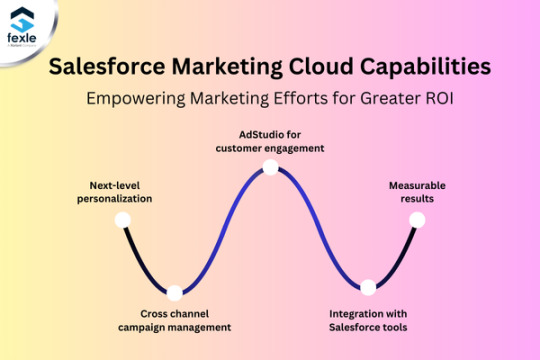
Salesforce Marketing Cloud is transforming the way businesses approach marketing campaigns. By combining the power of AI, data, and CRM, you can deliver personalized, targeted, and effective campaigns that drive greater ROI.
Learn more here!
#Salesforce marketing cloud services#Marketing efforts#salesforce crm#Fexle Services#Greater ROI#Salesforce consulting company#Salesforce platinum partner
0 notes
Text
Mastering Sales Incentive Strategies: Harnessing Historical Data and AI for Market Success

In today's dynamic business landscape, crafting an effective sales incentive strategy is crucial for driving profitability and maintaining a competitive edge. A well-structured incentive plan not only motivates sales teams but also aligns their efforts with the organization’s broader goals. With the rise of advanced data analytics and artificial intelligence (AI), companies now have unparalleled tools to refine their sales incentive strategies. This article delves into how leveraging historical sales data and AI can revolutionize incentive planning and propel business outcomes to new heights.
The Bedrock of a Successful Sales Incentive Strategy
A sales incentive strategy is a carefully crafted framework that employs a mix of rewards and recognitions to spur sales teams towards achieving and surpassing their targets. These incentives can range from tangible financial rewards like bonuses and commissions to intangible non-financial perks such as career advancement opportunities and public acknowledgment. The core objective is to synchronize the sales force's efforts with the company's strategic goals, driving growth and ensuring profitability.
Leveraging Historical Sales Performance Data
Historical sales data is a goldmine of insights that can shape effective incentive strategies. Here’s how organizations can harness this data to fine-tune their sales incentive programs:
1. Uncovering Successful Sales Patterns
By delving into past sales data, companies can identify patterns and trends that have historically led to success. Recognizing what has worked well enables businesses to design incentive plans that replicate these triumphs.
Example: A consumer electronics company noticed that their sales peaked during the holiday season when sales teams emphasized bundle deals. Armed with this insight, they crafted an incentive program that rewarded reps for promoting bundled products during key holiday periods, leading to a 30% increase in seasonal sales.
2. Profiling Top Performers
Analyzing the behaviors and tactics of top-performing sales reps can provide invaluable insights into what drives success. By pinpointing common traits and strategies among high achievers, companies can shape their incentive programs to encourage these behaviors across their entire sales team.
Example: A B2B software company found that their top performers consistently excelled in closing deals with small to medium-sized enterprises (SMEs) by offering personalized service and flexible pricing. They rolled out an incentive scheme that rewarded reps for adopting similar approaches, resulting in a 40% boost in SME sales.
3. Segmenting the Sales Force
Sales teams are typically composed of individuals with diverse levels of experience, expertise, and motivations. Segmenting the sales force based on performance data allows for the creation of customized incentive programs tailored to different groups within the team. This ensures that each segment is motivated by incentives that resonate most with them.
Example: A pharmaceutical company divided its sales team into new hires, mid-level reps, and seasoned veterans. They developed tailored incentive programs for each group, offering training incentives for new hires, performance bonuses for mid-level reps, and market expansion rewards for veterans. This segmented approach enhanced overall team performance and morale.
Integrating AI for Advanced Incentive Strategies
Artificial Intelligence (AI) has transformed various business aspects, including sales performance management. Here's how AI can amplify sales incentive strategies:
1. Predictive Analytics for Anticipating Trends
AI can sift through vast amounts of historical data to predict future sales trends and outcomes. This capability allows organizations to proactively adjust their incentive strategies to align with anticipated market changes. AI-driven predictive analytics can forecast which products or services will be in demand, identify the most effective sales techniques, and uncover potential opportunities or risks.
Example: A retail company utilized AI to forecast a rising demand for eco-friendly products based on evolving consumer preferences. They recalibrated their incentive plans to offer higher commissions on green products, capturing a significant share of the growing market segment.
2. Personalizing Incentive Programs
AI can analyze individual sales reps' performance and preferences to tailor personalized incentive plans. This level of customization ensures that incentives align with each rep’s unique motivations, whether they are driven by financial rewards, career advancement opportunities, or other factors.
Example: A telecommunications firm used AI to understand their sales reps' preferences and career aspirations. They developed personalized incentive packages, offering higher bonuses for reps motivated by financial gain and leadership opportunities for those seeking career progression. This approach significantly improved overall sales team satisfaction and performance.
Frequently Asked Questions (FAQs)
1. How can AI assist in designing an effective sales incentive strategy?
AI assists in crafting effective sales incentive strategies by analyzing historical sales data, identifying successful patterns, and predicting future trends. It enables the creation of personalized incentive plans and facilitates real-time adjustments to align with evolving market conditions and sales team dynamics.
2. What types of data are most crucial for developing a sales incentive strategy?
Crucial data for developing a sales incentive strategy includes historical sales performance, customer demographics and behavior, market trends, and individual sales reps' performance metrics. This data provides insights into what drives sales success and how best to motivate the sales team.
#finance#salesforce#Sales Incentive Strategies#Sales Incentive Plan#Sales Incentive Strategy#Sales Incentive Structure#sales incentive structures#Sales Performance Management#Sales Territory Planning#spmtribe#roi
0 notes
Text
How Salesforce Managed Services Can Help to Scale Up The ROI?

Introducing our latest blog: "How Salesforce Managed Services Can Help to Scale Up The ROI”
Dive into expert insights on how leveraging Salesforce Managed Services can supercharge your business's ROI and fuel exponential growth. Discover strategies, success stories, and actionable tips to maximize your Salesforce investment like never before.
Don't miss out! Read now: https://ablypro.com/how-salesforce-managed-services-can-help-to-scale-up-the-roi/
0 notes
Text
Salesforce Sales Cloud ROI Assessment: Uncovering the Hidden Values from a Successful Implementation
Embark on a deep dive into the strategic aspects of Salesforce Sales Cloud through our insightful blog. Discover how a meticulous examination of ROI can unveil concealed values in a triumphant implementation. Our experts will guide you through realizing the full potential of Salesforce Sales Cloud, optimizing processes, and amplifying returns. Gain valuable insights for enhancing business outcomes. Elevate your Salesforce experience, boost efficiency, and make informed decisions. Empower your sales strategy for lasting success. #Salesforce #SalesCloud #ROI #BusinessOptimization
0 notes
Text
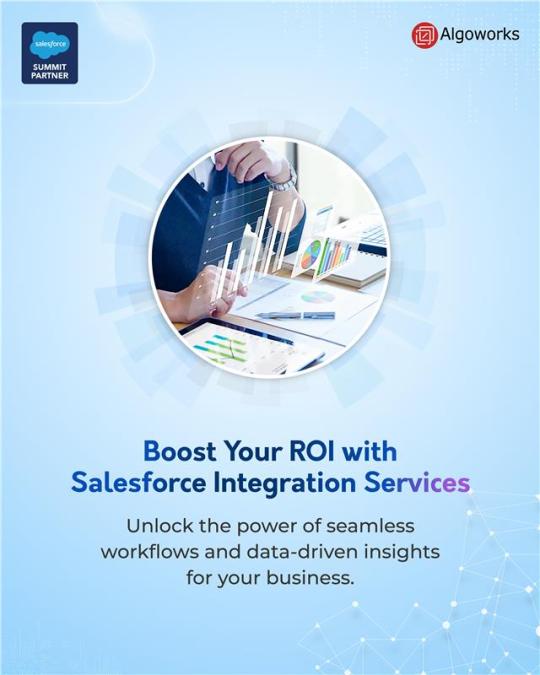



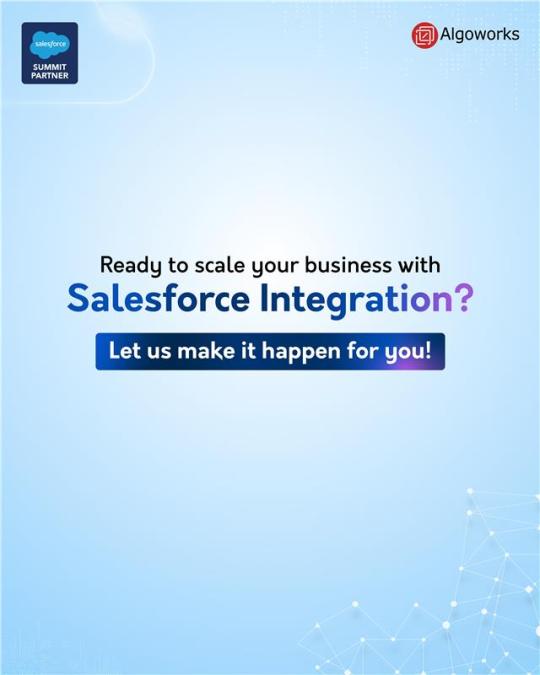
Want to boost your ROI? Our Salesforce Integration Services streamline workflows, connect systems, and deliver real-time insights to drive your success.
Let’s get started—connect with us today!
1 note
·
View note
Text
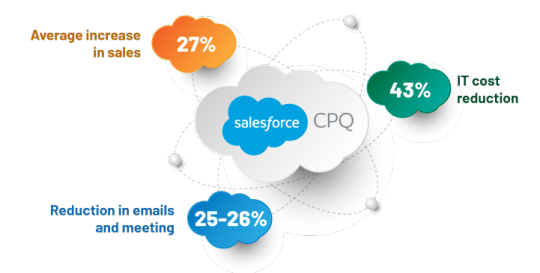
Calculate the ROI of Salesforce CPQ
Salesforce is truly a force; businesses worldwide have experienced a meteoric rise in their outcomes and processes. Calculate the ROI of your Salesforce project now: https://shorturl.at/7BzJR
Explore our Salesforce Professional Services: https://shorturl.at/5FdRd
#Salesforce CPQ#Salesforce CPQ ROI#Salesforce CPQ Cost Calculator#Salesforce Implementation ROI#Salesforce Revenue Cloud ROI#Salesforce Cloud ROI
1 note
·
View note
Text
Salesforce Consulting service: Helping you Meet your Goals
Unlock the full potential of Salesforce with expert consulting services! From seamless implementation to customization and automation, we help businesses optimize workflows, enhance customer relationships, and drive growth. Get tailored solutions that align with your goals and maximize your ROI.
2 notes
·
View notes
Text
𝐒𝐮𝐩𝐞𝐫𝐜𝐡𝐚𝐫𝐠𝐞 𝐘𝐨𝐮𝐫 𝐌𝐚𝐫𝐤𝐞𝐭𝐢𝐧𝐠 𝐰𝐢𝐭𝐡 𝐌𝐚𝐢𝐥𝐜𝐡𝐢𝐦𝐩 + 𝐒𝐚𝐥𝐞𝐬𝐟𝐨𝐫𝐜𝐞 𝐈𝐧𝐭𝐞𝐠𝐫𝐚𝐭𝐢𝐨𝐧!
Ready to take your marketing efforts to the next level? 🌟 With Mailchimp Integration with Salesforce, you can seamlessly sync your customer data, create personalized email campaigns, and drive higher engagement! 📈✨
💡 Improve your ROI with real-time data updates, boost customer targeting, and streamline your marketing strategy effortlessly! 🎯
Want to know how? 👉 𝐂𝐥𝐢𝐜𝐤 𝐨𝐧 𝐭𝐡𝐞 𝐜𝐨𝐦𝐦𝐞𝐧𝐭𝐬 𝐛𝐞𝐥𝐨𝐰 𝐟𝐨𝐫 𝐦𝐨𝐫𝐞 𝐢𝐧𝐟𝐨! 👇
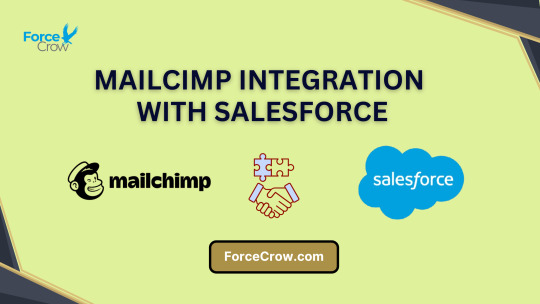
#Salesforce#Mailchimp#EmailMarketing#CRMIntegration#MarketingAutomation#CustomerEngagement#DigitalMarketing#CRM
2 notes
·
View notes
Text
Salesforce Implementation Partners in India: Unlocking CRM Excellence

Salesforce implementation partners in India are certified consulting firms that specialize in guiding businesses through the successful adoption and deployment of Salesforce CRM solutions. These partners possess extensive expertise in Salesforce products and best practices, offering 7a services, including planning, customization, integration, data migration, and post-implementation support.
They work closely with clients to understand their unique requirements, design tailored solutions, and ensure smooth and efficient implementations. With in-depth knowledge of local business landscapes and industries, Salesforce implementation partners in India play a pivotal role in driving CRM excellence and empowering organizations to harness the full potential of Salesforce to achieve their sales, marketing, and customer service goals.
Importance of choosing the right implementation partner
Choosing the right Salesforce implementation partner is paramount for a successful CRM deployment. Here are key reasons why this decision holds significance:
Expertise and Experience:
The right partner brings extensive knowledge and experience in Salesforce implementations, ensuring a smooth and efficient deployment. They understand the intricacies of Salesforce products and can tailor solutions to meet specific business needs.
Customized Solutions:
A reputable implementation partner takes the time to comprehend the organization's unique requirements and designs customized solutions that align with business goals, maximizing the value of the CRM platform.
Cost and Time Efficiency:
A skilled partner can expedite the implementation process, reducing downtime and minimizing potential disruptions to business operations. This efficiency translates to cost savings and quicker ROI.
Technical Proficiency:
Implementing Salesforce requires technical expertise, and the right partner possesses certified professionals who can handle complex configurations, integrations, and data migrations with proficiency.
Ongoing Support:
Beyond implementation, the right partner offers post-deployment support, training, and continuous optimization to ensure the CRM system evolves with changing business needs and industry trends.
Risk Mitigation:
An experienced partner can anticipate and address potential challenges during implementation, mitigating risks and ensuring a successful outcome for the project.
Industry Insights:
A knowledgeable partner with experience in the relevant industry can provide valuable insights and best practices, tailoring the CRM solution to industry-specific requirements.
Seamless Integration:
For businesses already using other systems or tools, the right partner can seamlessly integrate Salesforce with existing applications, creating a unified ecosystem and enhancing overall efficiency.
9. Change Management: The right partner assists in change management, helping employees adapt to the new CRM system and fostering user adoption, which is crucial for the success of any implementation.
10. Long-Term Partnership: Selecting the right partner establishes a long-term collaboration, ensuring continuous support, upgrades, and expertise throughout the CRM journey.
The Role of Salesforce Implementation Partners
A. Why Work with a Salesforce Implementation Partner?
1. Specialized Expertise: Salesforce implementation partners have specialized knowledge and expertise in Salesforce products, ensuring a smooth and effective deployment that aligns with business objectives.
2. Tailored Solutions: Partnering with experts allows organizations to receive customized solutions that cater to their specific needs, maximizing the benefits of the Salesforce CRM platform.
3. Faster Time-to-Value: With experience and best practices, implementation partners can expedite deployment, helping businesses achieve faster ROI and time-to-value.
4. Risk Mitigation: Implementation partners identify and address potential challenges, reducing the risk of errors and ensuring successful implementation with minimal disruptions.
5. Change Management Support: Partners assist in change management and user adoption, effectively guiding employees through the transition to the new CRM system.
B. The Value of Expertise and Experience in Successful Implementations:
1. Technical Proficiency: Implementation partners possess certified professionals with technical prowess, enabling seamless configurations, integrations, and data migrations.
2. Industry Knowledge: Experience in diverse industries equips partners to understand unique challenges and requirements, tailoring Salesforce solutions for specific sectors.
3. Best Practices: Having executed numerous implementations, partners apply proven methodologies and best practices, optimizing the CRM setup for maximum efficiency.
4. Scalability: Experienced partners design solutions that scale with business growth, accommodating future needs and organizational changes.
C. Services Provided by Salesforce Implementation Partners:
1. Requirements Analysis: Partners assess business needs and processes to determine the scope and objectives of the Salesforce implementation.
2. Customization and Configuration: Implementers tailor Salesforce to match specific business workflows and requirements, ensuring a seamless fit with existing processes.
3. Data Migration: Partners handle the secure and accurate data transfer from legacy systems to Salesforce, preserving data integrity.
4. Integration: Implementers integrate Salesforce with other applications and systems to create a unified ecosystem for data flow and efficient operations.
5. Training and Support: Partners provide comprehensive training and ongoing support to enable users to leverage Salesforce to its full potential.
6. Post-Implementation Optimization: After deployment, partners continuously optimize the system, improving based on feedback and changing business needs.
Salesforce Marketing Cloud Implementation
Salesforce Marketing Cloud Implementation is integrating and deploying Salesforce's robust marketing automation platform to optimize marketing strategies and enhance customer engagement. This implementation unlocks many capabilities, including email marketing, personalized content creation, social media management, and customer journey automation.
Businesses define their marketing objectives and workflows during the implementation, ensuring the platform aligns with their specific needs. Key steps include:
Configuring customer data.
Creating personalized customer segments.
Designing engaging email templates.
Setting up automated campaigns.
Integrating with other marketing tools and systems.
Salesforce Marketing Cloud empowers organizations to deliver targeted and relevant content to the right audience, at the right time, through the right channels. The implementation enables marketers to optimize campaigns, analyze performance metrics, and gain valuable insights into customer behavior, ultimately fostering stronger customer relationships and driving higher marketing ROI.
Successful Salesforce Marketing Cloud Implementation requires collaboration with experienced implementation partners who leverage their expertise to design tailored solutions, providing businesses with a competitive edge in today's dynamic marketing landscape.
Salesforce Sales Cloud Implementation
Salesforce Sales Cloud Implementation refers to deploying Salesforce's powerful customer relationship management (CRM) platform to streamline sales processes, enhance productivity, and optimize customer interactions. This implementation involves configuring the Sales Cloud to match the business's unique sales workflows and requirements.
Key steps in the implementation process include:
Setting up lead and opportunity management.
Defining sales processes.
Customizing sales stages.
Automating tasks and workflows.
Integrating with other business systems.
Data migration and training for sales teams are also essential components to ensure a smooth transition to the new CRM system.
Salesforce Sales Cloud empowers sales teams with valuable insights, real-time data, and automation tools, enabling them to effectively identify leads, track opportunities, and nurture customer relationships. The implementation drives sales efficiency, improves forecasting accuracy, and promotes collaboration among sales representatives.
To achieve a successful Salesforce Sales Cloud Implementation, businesses often engage with experienced implementation partners with the expertise to design a tailored CRM solution that aligns with the organization's specific sales goals, leading to increased sales effectiveness and revenue growth.
Salesforce Service Cloud Implementation
Salesforce Service Cloud Implementation involves the seamless integration and deployment of Salesforce's comprehensive customer service platform to enhance customer support operations and deliver exceptional service experiences. During the implementation process, businesses configure Service Cloud to align with their unique customer service workflows and requirements.
Key steps include:
Setting up case management.
Creating service queues.
Automating service processes with workflows.
Integrating with other systems to ensure a unified view of customer interactions.
Data migration and training for customer service teams are vital aspects of a successful implementation.
Salesforce Service Cloud empowers organizations to provide personalized, efficient, and timely customer support across various channels like email, phone, chat, and social media. The platform enables case resolution tracking, knowledge management, and self-service capabilities, improving customer satisfaction and loyalty.
Experienced Salesforce Service Cloud implementation partners can guide businesses through the process, designing a tailored solution that maximizes the platform's potential for delivering world-class customer service and driving enhanced customer engagement and loyalty.
Post-Implementation Support and Optimization
A. The Importance of Ongoing Support and Maintenance:
1. Ensuring System Stability: Ongoing support and maintenance ensure the Salesforce system remains stable, reducing the risk of downtime or performance issues.
2. Timely Issue Resolution: With continuous support, any technical glitches or user queries can be promptly addressed, minimizing disruptions to business operations.
3. User Training and Adoption: Post-implementation support includes training and guidance for users to maximize their proficiency and adoption of Salesforce features.
4. Data Integrity: Regular maintenance helps maintain data integrity, ensuring accurate and reliable information for informed decision-making.
B. Strategies for Optimizing Salesforce for Continuous Improvement:
1. Regular Performance Reviews: Conduct regular reviews to assess the system's performance, identify areas for improvement, and optimize configurations.
2. Feedback and User Input: Gather user feedback to understand pain points and enhancement opportunities, ensuring the system aligns with evolving business needs.
3. Customization Enhancements: Continuously customize Salesforce to accommodate new business processes and evolving requirements.
4. Data Analysis and Insights: Leverage data analytics to extract insights on sales, marketing, and service performance, informing strategic decision-making.
C. How to Leverage Salesforce Updates and New Features to Stay Ahead:
1. Stay Informed: Keep track of Salesforce release notes and updates to be aware of new features and improvements.
2. Training and Enablement: Train users on new features to fully leverage the platform's capabilities.
3. Strategic Implementation: Assess how new features align with business goals and implement them strategically for maximum impact.
4. Monitor Industry Trends: Stay abreast of industry trends and best practices to effectively leverage Salesforce's evolving capabilities.
Conclusion
Salesforce implementation is a transformative journey that requires careful planning, expert guidance, and continuous support. Choosing the right implementation partner ensures a seamless deployment, tailored solutions, and faster time-to-value. Expertise and experience are vital in successful implementations, optimizing Salesforce to meet specific business needs.
Salesforce Marketing Cloud, Sales Cloud, and Service Cloud implementations empower organizations to enhance marketing strategies, streamline sales processes, and deliver exceptional customer service. Post-implementation support and optimization are crucial for system stability, user adoption, and continuous improvement.
Staying informed about Salesforce updates and features enables businesses to stay ahead, driving innovation and achieving CRM excellence. With the right strategies and ongoing support, Salesforce implementations pave the way for enhanced productivity, improved customer engagement, and sustained success in a competitive business landscape.
3 notes
·
View notes
Text
Indoor Signage Strategies for Retail Success
Retail success hinges on creating engaging customer interactions. That begins with strategically-placed signage that draws passersby in for a look around merchandise. Indoor signs provide direction information, promote sales and other events, communicate professionalism and the company culture while communicating the personality and professionalism of your organization. Learn the best strategies for using indoor signs to increase ROI for your business.
Persuasive Sales Signage
Signage is an effective marketing strategy that blends relevance and personalization to create an enhanced customer experience. Signage has the power to attract the interest of captive audiences by appealing to their curiosity — something many other advertising mediums struggle with doing effectively.
Signage must be kept simple and understandable to be effective; signs should be tested by people unfamiliar with its content to make sure it makes sense and doesn’t confuse anyone.
Attractive Design
Attractive design involves striking a balance between form and function, which is especially essential when it comes to your threshold area, which consists of the first space customers step into when entering your store. At this pivotal moment, customers make snap judgements of its layout, colors, lighting fixtures, millwork displays, displays as well as products carts or signage you have placed within this threshold area.
Your retail store window displays can attract customers through the threshold area by highlighting your best products in an eye-catching way, drawing customers in and increasing sales by giving shoppers an opportunity to inspect specific items within context — for instance in living room settings or dressed mannequins. It is important to keep in mind, though, that attractive design cannot please everyone and so many stores focus their visual merchandising only towards specific groups of potential buyers; this principle is known as the “attractiveness principle.”
Accessible Features
Signs that clearly and visibly direct disabled shoppers to employees that can provide portable ramps is often all it takes. Also important are signs that identify the location of ADA bathrooms and exits with Braille or tactile characters to make life easier for these shoppers.
Informational displays are another type of retail signage. Their message must be easily understood so customers can grasp them in seconds — for instance, in a grocery store they could display posters that state “If you enjoyed reading X author, try this book too!” For instance, grocery store signs could state “If you liked reading this book, check out more books by them!”
Effective Messaging
Your signage serves as your 24/7 salesforce, continuously advertising your business around the clock and cost-effectively. Make sure it reflects your branding accurately while complementing interior design for optimal brand reinforcement. Informational signage must be easily understood, standing out from its environment, and drawing passersby’s attention from across your shop or building. It must also stand out against its background to grab passersby’s attention and draw their interest quickly and clearly.
Your signage needs to engage customers and keep them returning for more, something which may not be as straightforward as calculating ROI but remains equally critical to its long-term success. Much like you set standards and expectations for employees’ performance, quality, visibility, messaging and style of signage requires careful thought and consideration if you want it to bring return and improve the shopper experience. By following best practices you can increase both ROI on signage while simultaneously providing customers with a pleasant shopping experience.
2 notes
·
View notes